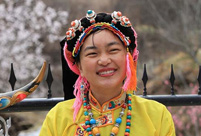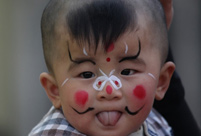 'Model husband' shatters image of love
'Model husband' shatters image of love
 Can animals smile? Or put on a happy face
Can animals smile? Or put on a happy face
 Geng Xuan crowned at 9th China Super Model Contest
Geng Xuan crowned at 9th China Super Model Contest
 Top 10 billionaires in the liquor industry
Top 10 billionaires in the liquor industry
 Backstage at China Fashion Week
Backstage at China Fashion Week
 Ballerinas anywhere but onstage
Ballerinas anywhere but onstage
 Top 10 safest airlines in the world
Top 10 safest airlines in the world
 Posters of 33rd HK Film Awards unveiled
Posters of 33rd HK Film Awards unveiled
 Top 10 most popular instant messaging apps in the world
Top 10 most popular instant messaging apps in the world
 Inspiring shadow images of Chinese army
Inspiring shadow images of Chinese army
Johannesburg is home to a vast number of small Chinese businesses. Crown Mines, Cyrildene and various China Malls around the city are recognised as a nexus for all small Chinese traders. Generally offering a good deal, not many have explored how they came to be here.
Chinese traders have a distinctive way of managing their money. Not entirely integrated into the South African banking system or the tax system, Chinese business owners feel targeted and unsafe in this country.
The history of the Chinese trader
Alexander Chou is a Taiwanese diplomat at the Taipei Liaison Office of South Africa. Speaking with a slight American twang, he paints a picture of the unhappy Chinese merchant in South Africa.
“Even today there is a large group of Chinese in Johannesburg waiting for more gold to be found, wanting ‘to make it big’.”
Small Chinese businesses developed when independent Chinese immigrants started coming to South Africa in 1870, says Chou. Unlike indentured Chinese slaves who were forced to work for a fixed term and salary in the mines, these independent immigrants were prohibited from obtaining mining contracts so they turned to trade instead.
During a more recent wave of immigration, Steve Yeh arrived in South Africa with his family in 1991 when he was 10. His uncle’s family had already settled in Johannesburg and was convinced that more gold would be discovered. Chou confirmed this by saying that even today there is a large group of Chinese in Johannesburg waiting for more gold to be found, wanting “to make it big”.
During apartheid Chinese traders were affected by the Group Areas Act of 1950 and forced to operate from areas designated as “non-white”. These small businesses catered exclusively for the black community.
Although apartheid has been officially over for almost 20 years, Chinese traders still seem to be separated from the rest of Johannesburg, choosing to do business in specific areas.
“Asians are not safe in this country”
Yeh works as a general manager and head of security at China Mart in the Crown Mines area of Johannesburg. He is a South African citizen but desperately wants to return to Taipei, Taiwan, with his wife and child.
“Asians are not safe in this country,” Yeh says. He feels that Chinese people are specifically targeted by criminals in Johannesburg. “It’s because we don’t like banks.”
The miserable merchant
According to Chou, Chinese traders do not plan to stay in Johannesburg forever. He says, if there is one thing to understand about the Chinese, it is that they are not scared to face hard times. Most Chinese put a great emphasis on education and working hard for their families, unlike other cultures.
“They will live off vegetables for the rest of their lives, to be able to afford a good education for their children. White people are so selfish. They will never sacrifice anything. They will never give to their brothers and sisters. Each and every one lives for themselves,” he says.
The honorary white
Skilled Taiwanese traders came to South Africa in large numbers between 1970 and 1990. South Africa saw Taiwan’s potential to help increase foreign investment and provided incentives to start up manufacturing companies in the rural and industrial areas of Johannesburg. This also helped the apartheid government keep non-whites out of urban Johannesburg as the Taiwanese businesses provided jobs for them outside the city.
These Taiwanese traders were given “honorary white” status. They were exempt from segregation legislation. The benefits did not seem to last long, though, as many Taiwanese immigrants later decided to leave. This was due to the lack of job opportunities, the increase in crime, difficulties with South African labour legislation and strict laws on importing goods. In 1998 South Africa also officially recognised the People’s Republic of China, which created a strong economic relationship between the two countries, yet subsequently alienated people of Taiwanese origin.
“They [Taiwanese immigrants] were so well skilled, but they couldn’t find jobs. The unions did nothing to protect them and the South African government flushed away their investment like one flushes a stool,” Chou says.
Yeh explains the Taiwanese attitude towards government officials: In Taiwan, if someone doesn’t get an answer within 15 minutes of inquiring at official state institutions, the head of the department will have a big problem, “to the point where he might even be asked to step down. We as citizens pay your [government officials] salary. If you are not capable then you must step the hell down!”
Avoiding tax
Yeh says Chinese merchants do not trust the South African government. They do not want to pay tax or be “on the record”.
Almost all of the small business owners in Cyrildene only accept cash. Yeh says small Chinese businesses are “barely getting by” and they do not want to have to pay extra for bank charges. Instead they choose to have a substantial amount of cash on hand daily which makes them “easy targets” for robbery, says Yeh.
China Mall in Crown Mines is a hub for Chinese wholesalers. Surrounded by containers, it is where most Chinese small business owners come to purchase goods in bulk for their stores in other areas of Johannesburg.
“I have to stay here, thanks to your home affairs.”
“A family that comes to Johannesburg to make money doesn’t want to lose money by becoming involved in the tax system when they know it is all corrupt,” says Frank Zhang, a restaurateur and clothing shop owner.
Zhang explains that when traders come to China Mall to purchase goods, they are spending hundreds of thousands of rands in cash at a time. “There is no way they will swipe for that and lose money from the bank charges.
“Of course this makes them vulnerable to crime because then criminals know they have large amounts of cash on them. That is why many people will live behind, or very close to, their business,” says Zhang.
Recognised, registered and taxed
It is not only bank charges that prevent Chinese traders from making use of bank services. Like Yeh, who says he still has not received his South African passport, which he applied for 15 years ago, many Chinese traders have a non-resident status. “I have to stay here, thanks to your home affairs,” says Yeh.
This makes opening a bank account difficult and further removes Chinese traders from the South African business network.
According to Anile Hlalukana from the South African Revenue Services (SARS), a small Chinese business owner can only be taxed if they are registered as a sole trader with SARS.
To make use of card machines, they would need a business bank account and the only way to get one is to be registered as a business with SARS.
Alycia Jacobs, a business banker at Standard Bank, says as long as someone is receiving a monthly income in South Africa, foreign or not, they have to be taxed. “Where does the money go if they don’t have a bank account? Are they sending it abroad? Are they keeping it in their homes? They must have an account.”
Zhang says some small Chinese traders register their businesses under the name of a company to get a tax number. This company will usually be associated with a freighting or shipping firm. Traders can then open a bank account for their business which they use “for show” as all major money transactions are done in cash only.

 Wonderful moment of China's airborne forces
Wonderful moment of China's airborne forces Bai Baihe shoots for fashion magazine
Bai Baihe shoots for fashion magazine Red terraced fields in Dongchuan of Yunnan
Red terraced fields in Dongchuan of Yunnan Jiaju Tibetan Village
Jiaju Tibetan Village Spring dating
Spring dating Confucius institute at UC Davis
Confucius institute at UC Davis Little painted faces at temple fair
Little painted faces at temple fair Top 10 safest airlines in the world
Top 10 safest airlines in the world Foreign students at China-Myanmar border
Foreign students at China-Myanmar border The backstage of the Fashion Week
The backstage of the Fashion Week College students in Han costumes
College students in Han costumes Postgraduate works as waitress
Postgraduate works as waitress Life in a Lahu village in Yunnan
Life in a Lahu village in Yunnan An orphan’s wedding
An orphan’s wedding Hollywood documentary brings Diaoyu Islands truth to new audience
Hollywood documentary brings Diaoyu Islands truth to new audienceDay|Week|Month